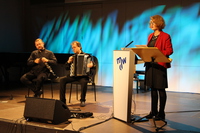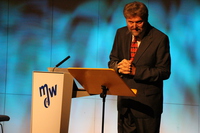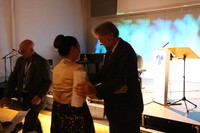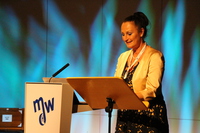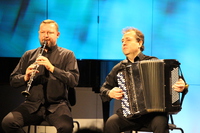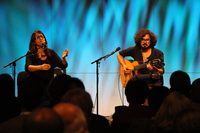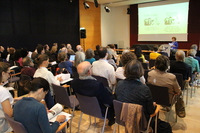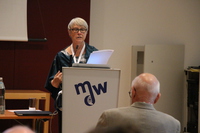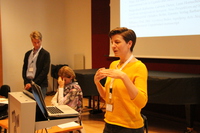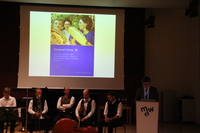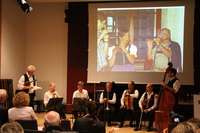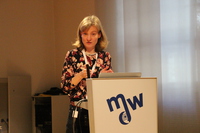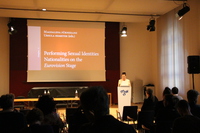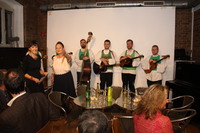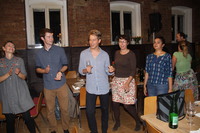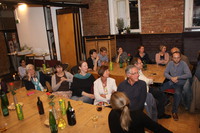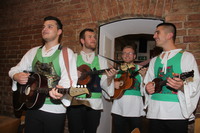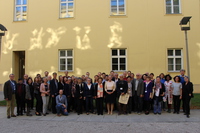Welcome Symposium for the
International Council for Traditional Music
at the mdw
Musics Matter!
Ethnomusicology and its
Socio-Political Relevance Today
28–30|09|2017
mdw – University of Music and
Performing Arts Vienna
3., Anton-von-Webern-Platz 1
PROGRAM
Thursday, 28.9. | Joseph Haydn-Saal
17:00 Registration
18:30 Opening Ceremony
Welcome address by the Rector of the mdw, Ulrike Sych
President of the ICTM, Salwa El Shawan Castelo-Branco
Outgoing Secretary of the ICTM, Svanibor Pettan
Incoming Secretary of the ICTM, Ursula Hemetek
Keynote by Anthony Seeger
► How Does Ethnomusicology Matter? The Socio-Political Relevance of
Ethnomusicology in the 21st Century
Musical contributions by
Klezmer reloaded, Lasanthi Manaranjanie Kalinga Dona, Sakina & Mahan Mirarab
Buffet
Friday, 29.9. | Fanny Hensel-Saal
10:00-11:30 Paper Session
Salwa El-Shawan Castelo-Branco
The Politics and Ethics of Music Heritage
Naila Ceribašić
Policy in the Field: On Brokerage and Other Services to National and International Agencies
Dan Lundberg
Music Archives, Identity, and Democracy. The Role of Archives in New Perspectives
Coffee Break
12:00-13:00 Paper Session
Beverley Diamond
How Indigenous Sociopolitical Resurgence and Ontological Encounters Might Change Ethnomusicology
Bernd Brabec de Mori
“Ethno” Constructions in Sound Ontologies of Contemporary Medicine and Therapy: Relevance and Criticism
Lunch Break
14:30-16:00 Paper Session
Tom Solomon
Postcolonialism and Ethnomusicology: Issues, Challenges, and Prospects
Tina K. Ramnarine
Music, Labour Histories and Decolonising Scholarship
Rasika Ajotikar
Caste-ing Music: Decolonising Knowledge in Postcolonial India
Coffee Break
16:30-17:30 Paper Session
Cornelia Gruber
The Politics of Women Dancing in Madagascar: Juxtaposing Perspectives on Gender in Ethnomusicology
Selena Rakočević
Practicing Ethnomusicology/Ethnochoreology within Post-Socialist Realities. Some Comparative Experiences from Serbia
19:00 Book Presentation
European Voices III. The Instrumentation and Instrumentalization
of Sound. Local Multipart Music Practices in Europe.
Edited by Ardian Ahmedaja
Music: Die Tanzgeiger
Buffet
Saturday, 30.9. | Fanny Hensel-Saal
10:00-11:30 Paper Session
Samuel Araujo
Music, Research and Public Interest – A Dialogical Praxis for Social Justice
Philip V. Bohlman
"And from the Ruins of Time They Blossom" – On the Moral Imperative in Ethnomusicology
Tan Sooi Beng
Mediating Inclusion and Intercultural Dialogue through Community Music and the Arts in Malaysia
Coffee break
12:00-13:00 Paper Session
Adelaida Reyes
The Beneficence and the Tyranny of Paradigms: Refugees, Nation-States, and Musical Life
Svanibor Pettan
Religions Matter! Exploring Ethnomusicology of Religion
Lunch
14:30-15:30 Paper Session
Ana Hofman
“All in one voice”: All in One Voice: Ethnomusicology of Dissensus
Britta Sweers
The Position of University-Based Ethnomusicology from an Interdisciplinary Perspective
Coffee break
17:00 Book Presentation
Performing Sexual Identities. Nationalities on the Eurovision Stage
Edited by Magdalena Fürnkranz and Ursula Hemetek
18:30 Closing Event at the Croatian Center with Buffet & Music
Welcome ICTM!
The symposium “Musics matter! The Socio-Political Relevance of Ethnomusicology Today” marks the transfer of the ICTM Secretariat from Ljubljana to Vienna. The ICTM is the largest international ethnomusicological society worldwide with a 70-year history. The board is elected by the membership and mirrors the diversity of the ICTM.
The Secretariat is the body responsible for the day-to-day operations of the ICTM, and is the main channel of communication between the Council’s governing body—the Executive Board—and its members, subscribers, partners, and affiliates. Therefore its role is crucial in the governing of the ICTM, and it is a great honour and opportunity for the University of Music and Performing Arts Vienna to host it. The Department of Folk Music Research and Ethnomusicology has longstanding relations to the ICTM, and in my own career at this institution the ICTM has played an important role, especially in establishing the focus on music and minorities. I have learned about the socio-political relevance of this issue and the role that ethnomusicology can play by focussing on such a topic. But it is not only in minority research that ethnomusicology acquires political relevance. There are many more approaches worldwide.
Therefore we have invited scholars who represent this agenda. The program has been constructed around the relevant discourses in ethnomusicology on that topic.
The keynote is intended to give an introduction on to what extent music itself and the study of music matters. An important field connected to political relevance is heritage, either in connection with the UNESCO or with archives. Ontologies of indigenous groups and their relevance in knowledge production is discussed in ethnomusicology nowadays as well as the possibilities of decolonising the discipline. Two papers from ethnochoreology explore dance from the gender perspective and in the post-socialist political structures. Different approaches from applied ethnomusicology deal with social justice, participatory dialogical practice, and the socio-political relevance of performance. Forced migration as well as religion should be seen as comprehensive topics for future ethnomusicology. Finally, we will discuss activism and politics in academia. The program mirrors influential discourses of ethnomusicology today that will definitely shape the future development of the discipline.
Ursula Hemetek
Organizing committee: Ursula Hemetek, Hande Sağlam, Marko Kölbl, Martina Krammer
No registration fee
Registration recommended: krammer@mdw.ac.at
Department of Folk Music Research and Ethnomusicology
Anton-von-Webern-Platz 1, 1030 Wien
Tel: +43 1 711 55 - 4201 | mdw.ac.at/ive
IMPRESSIONS

